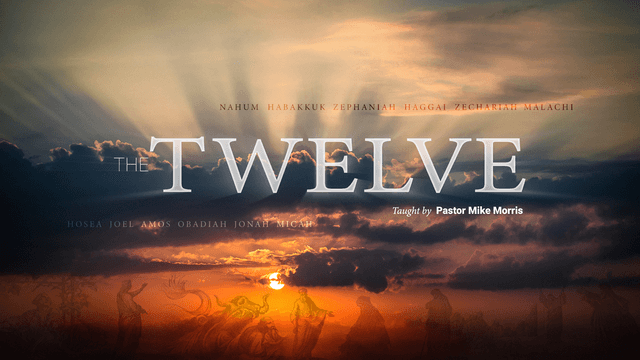Sunday Service 9am & 11am
Wednesday Service 7pm
(210) 920-6502
551 E Nakoma St.
San Antonio, TX 78216
Join a small group to study this sermon with like-minded believers.
Joel 2:18-27
LISTEN. STUDY. APPLY
Video
Audio
Manuscript
Welcome back to our study of the Twelve, the ancient Hebrew name for the Old Testament books that we call the minor prophets. the last twelve books in your Old Testament.
Today we continue our study of the brief book of the prophet Joel. and as we always do here at VBVF, we are careful to consider the background and context of a biblical book. this is our ninth book in this series. so let’s set the prophet Joel in the context of The Twelve..
Let’s look at the timelines of the two Israelite nations in the time of the divided monarchy, Israel in the north and Judah in the south.
The voices of the prophets ceased in the north as the Assyrians crushed Israel, taking them into captivity in 722 BC, an exile from which they never returned.
Judah endured another 135 years before falling to the Babylonians, the nation that conquered the Assyrians. our studies of Jonah through the beginning of Joel are available on our website, vbvf.org, under the “Old Testament” tile. Look for the series entitled “The Twelve”
In addition to the historical setting, let’s review some other important features.
Author: the author of the book is Joel, which means “The Lord is God” The superscription, 1.1, tells us everything that we know about him, which isn’t much.
Date/Historical Setting: the date that seems to fit the context and content of the book is very close to the Babylonian exile, probably just before or perhaps just after, sometime from about 600 BC to 500 BC.that makes Joel the final pre-exilic prophet, or the final prophet through whom God spoke just before, and just as, His people were taken into exile in Babylon. the next three – Haggai, Zechariah, and Malachi – were all written after the return of the people back to the land of Judah.
Content: Joel is an important book, and links closely to other OT prophetic books. As we saw last time, the book opens with a people on the brink of disaster, facing a plague of locusts; amid that disaster, Joel calls them to repentance. God finally speaks in 2.12. “Yet even now,” declares the Lord, “return to me with all your heart, with fasting, with weeping, and with mourning; and rend your hearts and not your garments.”.God promises His people restoration and blessing if they will return to Him with real, not ritual, repentance. and following that implied return of the people to God, the Lord describes two blessings: one lesser, one greater. presented in that order. today we will cover the lesser blessing. next time, the greater blessing.
Structure: There are two distinct parts of the book. the first is the descent into tragedy (1.1 – 2.17) and the second describes God’s blessing of His people, which begins with our text for today, 2.18-27, and continues to the end of chapter three. let’s look more closely at the passage for today.
Chapter 2 verse 18 is a transition that changes the focus from tragedy and repentance to blessing, and from Joel as spokesman for Yahweh to Yahweh Himself as the speaker.
In the next passage, 2.19-27, God describes what He will do to reverse the devastation of the locust plague from Chapter 1. We’ll examine that in more depth in just a moment.
Next time, we’ll cover 2.28-32, a noteworthy prophecy of the coming of the Holy Spirit, which is quoted by Peter in Acts 2 at Pentecost. then the fourth passage in the book, chapter 3, draws the prophecy to a close with Joel’s account of the salvation of God poured out on His people and His judgment poured out on His enemies. extra credit for reading ahead.
Themes: What’s this book about? Joel’s prophecy has a central focus. the picture we find in this book is one of great judgment and suffering, but also one of great hope. and both the judgment and the hope are expressed in terms of the Day of the Lord. and let’s consider for a moment what this term the “Day of the Lord” really means. Christians, especially those with a deep interest in eschatology, the study of the end times, may see the Day of the Lord primarily, if not exclusively, through that lens – what God is going to do at the end of days. some see it as a judgment of God to be unleashed upon the nations who have attacked and oppressed Israel, such as in Jeremiah (46.10) and Obadiah (1.15). but Zephaniah (14.1-3) and Amos (5.18-24) see the Day of the Lord as a day of judgment against God’s people. Malachi 4.5 sees the Day of the Lord, described as the great and awesome day of the Lord, as the day of the coming of Messiah, preceded by the coming of the prophet Elijah, a prophecy Jesus understood to be fulfilled by the coming of John the Baptist (Matthew 11.14).for Joel, the Day of the Lord is both.
A day of judgment for God’s people as the Lord draws them back to Himself through the plague of locusts, and also a day of judgment for the nations, as God punishes those who have mistreated His people, Israel. Joel’s concept of the Day of the Lord is broader than any other prophet, for he sees the Day of the Lord as simply when and how Yahweh chooses to act regarding humanity, for He is constantly moving His kingdom forward through history.in this book, everything is cast as part of the Day of the Lord. the devastation of the locust plague, the coming of the Spirit accompanied by wonders in the heavens and the earth, and the judgment of the nations. All are seen as elements of the Day of the Lord, the hand of the Almighty God at work in His creation.
At the center of the narrative is a dramatic change. from the descent into tragedy and despair, complete with a plague of locusts, followed by a challenge to return to God in repentance all in 1.1 through 2.17. Now the book completely changes. The people of Judah have obeyed God’s command to turn from their sins and return to the Lord.
So let’s reconsider for a moment the first passage, God’s redemptive judgment and His call to return to Him. What did you do with that principle that God calls His people to repent from their sins, setting aside rituals in favor of a heartfelt return to God? Did you deeply consider your life in light of that offer from the Lord? Did you look within yourself and see any sins that the Spirit prompted you to put to death, as Romans 8.13 says?
If you did, then Joel 2.18 and following is your reward, for the Lord truly blesses those who repent of sin and return to Him.
Pity for a People
We begin with a transition verse.
18 Then the Lord became jealous for his land and had pity on his people.
“Then” is the key. evidently, the people obeyed the word of God in 2.12-13.in response, God was moved with pity, meaning to act toward someone with compassion and mercy.
So what is this lesser blessing God gives the people of Judah? What does God do when He pours out compassion and mercy on His people? This passage shows us five things.
Renewal (2.19)
19 The Lord answered and said to his people,
“Behold, I am sending to you
grain, wine, and oil,
and you will be satisfied;
and I will no more make you
a reproach among the nations.
Write this down as #1: He renews them. the first thing the Lord does is to renew the land and the people. He sends to Judah what the locust had taken. the grain fields, the grapevines, and the olive groves are brought back to fruitfulness as before.
Remember in 2.3 the description of the locust devastation.
Fire devours before them, and behind them a flame burns. The land is like the garden of Eden before them, but behind them a desolate wilderness, and nothing escapes them. .but now the people are again satisfied with a bountiful crop, with vats overflowing with wine and oil.
And added to the productivity of the land is a renewal of Judah’s standing among the nations surrounding them; no longer are they a reproach among the nations, ridiculed because their own God judged them through the locusts. now, the people will be vindicated as God’s own possession. they, and the land, have been renewed.
We also see in this verse the beginning of an inclusio, a literary technique designed to draw attention to the writer’s point by the repetition of a word or thought. here, the repeated word is “satisfied”. we’ll see that word again in verse 26 at the end of the passage. so keep that idea in mind, that God and His work is deeply satisfying to His people as He meets all of their needs.
Rescue (2.20)
20 “I will remove the northerner far from you,
and drive him into a parched and desolate land,
his vanguard into the eastern sea,
and his rear guard into the western sea;
the stench and foul smell of him will rise,
for he has done great things.
Write this down as #2: He rescues them Rescuing His people is another of the blessings God takes upon Himself on behalf of His people. many examples come to mind. the Exodus from Egypt, the entry into Canaan, the rescue of David from the hand of Saul, and the rescue of Peter from prison in Acts. He seems to delight in snatching His beloved from the threats and roaring of the wicked.
This passage, however, is a bit of a mystery. from the earlier context of a locust plague, we might immediately conclude that the “northerner” must be a locust plague, but that is unlikely. In the land of Israel, locusts generally approached from the south or southeast, not the north. Also, the language here sounds like a vast human army. so what else could this reference to the “northerner” mean? What enemy will the Lord defeat on behalf of His people?
We find clauses in other OT books: throughout the OT, Israel, and Judah are threatened by nations from the north. Isaiah 41 describes a threat from the north, Zephaniah 2 names Assyria from the north as a threat, and Zechariah 2 refers to Babylon as “the land of the north” but it’s Jeremiah who speaks the most of the threat to Israel from the north, naming Nebuchadnezzar in 25.9.in light of these passages, we can conclude that the “northerner” in Joel is likely a large and threatening human army, very possibly one that Joel foresees as a threat to God’s people in the end times.it’s clear that the Lord decisively defeats this army on behalf of Israel, sweeping it aside into the Dead Sea on the east and the Mediterranean Sea on the west. The Lord will rescue His people and remove the threat from their border.
Rejoicing (2.21-24)
21 “Fear not, O land;
be glad and rejoice,
for the Lord has done great things!
22 Fear not, you beasts of the field,
for the pastures of the wilderness are green;
the tree bears its fruit;
the fig tree and vine give their full yield.
23 “Be glad, O children of Zion,
and rejoice in the Lord your God,
for he has given the early rain for your vindication;
he has poured down for you abundant rain,
the early and the latter rain, as before.
24 “The threshing floors shall be full of grain;
the vats shall overflow with wine and oil.
Write this down as #3: He causes them to rejoice “Be glad” and “rejoice” mean the same thing: to shout in exultation, to express great joy.
The land and the beasts are no longer afraid, and the children of Zion, a particularly evocative phrase, rejoice in the Lord. the blessings of the Lord fill our hearts with joy.
Of all the psalms which speak of joy, two, in particular, could have been written by the people of Judah during these days of rejoicing.
Psalm 13.5-6 5 But I have trusted in your steadfast love;
my heart shall rejoice in your salvation.
6 I will sing to the Lord,
because he has dealt bountifully with me.
And Psalm 31.7-8. 7 I will rejoice and be glad in your steadfast love,
because you have seen my affliction;
you have known the distress of my soul,
8 and you have not delivered me into the hand of the enemy;
you have set my feet in a broad place.
These two psalms extol the goodness of God for two specific acts: His bountiful blessing of His people, and His deliverance from their enemies. two of the key elements in this passage.
Our God is a good God, a gracious God, a God whose mercies are new each morning. and those who know Him will always respond to a call to praise and worship and glorify His Name.
We will be moved by God’s goodness to rejoice in Him, but in a related passage in Jeremiah, the Lord Himself says,
41 I will rejoice in doing them good, and I will plant them in this land in faithfulness, with all my heart and all my soul. (Jeremiah 32.41) He rejoices to bless His people! What an incredible thought!
Restoration (2.25)
25 I will restore to you the years
that the swarming locust has eaten,
the hopper, the destroyer, and the cutter,
my great army, which I sent among you.
Write this down as #4: He restores them This is a well-known verse, one both Tony and I have referred to in previous sermons. As we consider it, let’s first look at it in context.
For Judah, as they heard these words, it would have been clear that Yahweh would restore the agricultural economy destroyed by the locusts. what they had lost in the fields, in the vines and groves, both in a single harvest and in the loss of seed for the next season, would be made whole. this was surely fulfilled when the people returned to the land after the Babylonian exile and found their lives restored in the land. but what does this mean for us today? God sometimes does restore all that the enemy has taken from us. but sometimes those losses remain. relationships are damaged or lost, friends and family pass away too soon, and sinful choices can cause lifelong effects of pain and suffering. We all know these things can and do happen. but our God is both all-powerful and kind beyond all measure. and we can trust that when He restores all we have lost, it is for His glory and our good. and when He ordains for us seasons of loss, we trust Him in those days, too. but never doubt His power or His mercy or His goodness. for we can rest in Ephesians 3.20-21: 20 Now unto him that is able to do exceeding abundantly above all that we ask or think, according to the power that worketh in us,
Let me break that down for us just a little more.
God can do what you ask.
He can do all you ask.
He can do above all that you ask.
He can do abundantly above all that you ask.
God can do ‘exceeding abundantly above all [you] can ask or think’ (Eph. 3:20).
One final thought on this: remember that while God may choose to restore all that was lost, or He may choose to leave painful circumstances as they are, no matter what He chooses, He will restore your soul. (Psalm 23.3) That truth is, of course, from Psalm 23, a favorite psalm of mine, and to my mind, it’s perhaps the most significant restoration God can grant us. while regaining what the locusts devoured may be important, I think the true blessing is when, in the quiet, the spirit of God does His restorative work in the human soul, drawing us away from the shallow and empty things of this world and drawing us to Himself in all His fullness. the ultimate restoration of what the locusts took away isn’t to regain crops and grapes and olives.it is to receive Christ.
Paul reminds us of this truth in Philippians 3. 7 But whatever gain I had, I counted as loss for the sake of Christ. 8 Indeed, I count everything as loss because of the surpassing worth of knowing Christ Jesus my Lord. For his sake I have suffered the loss of all things and count them as rubbish, in order that I may gain Christ 9 and be found in him, not having a righteousness of my own that comes from the law, but that which comes through faith in Christ, the righteousness from God that depends on faith— 10 that I may know him and the power of his resurrection, and may share his sufferings, becoming like him in his death, 11 that by any means possible I may attain the resurrection from the dead.
After coming to faith in Christ, Paul lost much in this world – position, dignity, wealth, relationships. but he gained far more in Jesus than he lost in the world. As he neared the end of his life, he rejoiced that God had restored not the same things he lost, but something far better.to know Jesus and His power, and to be granted to share in His sufferings. and someday to share eternity with His Lord. as we also will, by God’s mercy.
Redemption (2.26-27)
26 “You shall eat in plenty and be satisfied,
and praise the name of the Lord your God,
who has dealt wondrously with you.
And my people shall never again be put to shame.
27 You shall know that I am in the midst of Israel,
and that I am the Lord your God and there is none else.
And my people shall never again be put to shame.
Write this down as #5: He redeems them These two verses serve as a type of summary for the entire lesser blessing passage. He promises a near-paradise for the people of the ancient Near East. a place where there is plenty of food – grain, grapes, olives, cattle, sheep, goats. for people in that day, starvation was a constant threat. Whether locusts, weather, crop failure, or attack from their enemies, people could go hungry at any time.
But God’s promise isn’t just that they would eat in plenty, but that the people will be satisfied. this is the closure of the inclusio that began in verse 18 and completes this passage. It’s one blessing to eat and drink, it’s another, better one to be satisfied with what you have. we still need that blessing today, to be satisfied and content with what God provides instead of dissatisfied with what He has, in His grace, withheld.
Application
So we’ve seen how God promised to bless the people of Judah. How can we apply these truths to our own lives?
Do we need the renewal only the Lord can provide? Do you need Him to renew a right spirit within you, as David did?
Do we need to ask God for rescue? Do you sense that you’re surrounded and need Him to step in and defeat your enemies?
How can we rejoice in our God? Is your heart always ready to praise the Lord?
Do we need God’s restoration – both for what we’ve lost but also for what we have gained in Jesus Christ?
Can we rest in God’s redemptive work in our lives, satisfied with who He is and what He’s doing in us?
Remember, this passage today is the lesser blessing. As wondrous as these blessings are, they are not yet God’s best for His people. the next time we return to the book of Joel, we’ll look deeply into the greater blessing. here’s what’s coming next.
“And it shall come to pass afterward,
that I will pour out my Spirit on all flesh;
your sons and your daughters shall prophesy,
your old men shall dream dreams,
and your young men shall see visions.
29 Even on the male and female servants
in those days I will pour out my Spirit.
Blessed be the Name of the Lord!
May the God of hope fill you with all joy and peace in believing, so that by the power of the Holy Spirit you may abound in hope. (Romans 15.13)

Taught by Mike Morris
Associate Pastor of Verse By Verse Fellowship
The Twelve Series
LATEST SERMONS
BROWSE THE LATEST SERMONS








